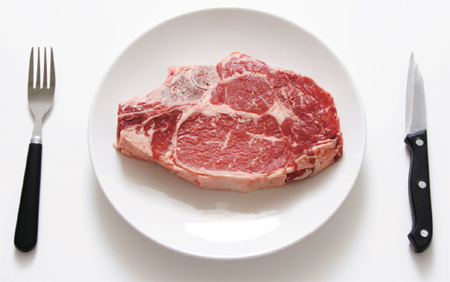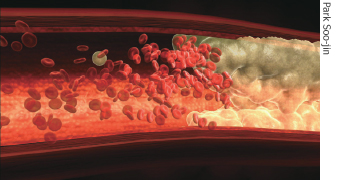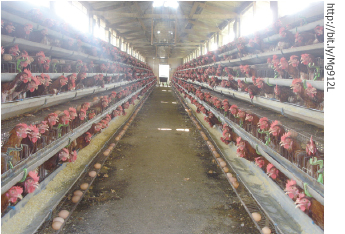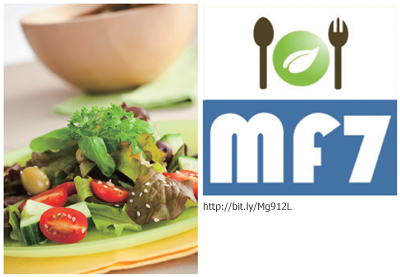
Mr. A is an ordinary office worker living in the 21st century. For the breakfast, he eats beef stew cooked by his wife. He eats jeyuk-deopbap (Stir-Fried Pork with rice) or just buys a hamburger for his lunch. Because of his company’s culture, he eats samgyeopsal (Korean-Style Bacon) and drinks a lot of soju for dinner. This routine eventually became a part of his everyday life. Then, what will happen next? Let us look at his eating habits. From breakfast to dinner, he eats MEAT with every meal! It can cause many problems if he eats too much. We call a person who eats only vegetables and no meat, a vegetarian. For the same reason, we should call the people who eat a lot of meat, ‘Meatatarians.’ In this article, we show how being a meatatarian can cause adult diseases, the opposition from animal protection groups as well as environmental problems. We will also offer possible solutions to these problems.
This is not another’s story: adult disease
When people think about the consequences of a meat-based diet, they usually come up with an example of an adult disease. An adult disease (the same as lifestyle-related disease,) called a ‘disease of culture,’ occurs due to the particular development of a culture. Nowadays, many symptoms occur because of the inflow of Western culture. For centuries, Eastern culture has sustained on a vegetable-based food culture. However, as the influx of western culture increased, especially regarding food, adult diseases began occurring more frequently in Eastern countries.

There are countless adult diseases; with obesity and the malfunction of the circulatory systems being among the main problems. Obesity is not just about being overweight because people’s muscles weigh more than fat. The actual definition is the condition of how much fat they have in their entire body. Body Mass Index (BMI) is the main standard to determine whether a person is obese or not. If one’s BMI number is higher than 25, doctors classify their patient as being obese. Obesity is especially dangerous because it does not show superficial symptoms and leads to further complications.
The other main problem is the malfunction of the circulatory system: cardiovascular disease. Cardiovascular disease affects one’s heart and arteries. Obesity and the excessive consumption of meat can cause arteriosclerosis, hypertension, and ischemic heart diseases. In addition, stroke, angina pectoris and myocardial infarctions can occur. Arteriosclerosis is dangerous because fat can stick to the wall of the arteries making the arteries hard and non-elastic to the point where eventually an artery can burst. As well, fat narrows the arteries, hindering blood flow, which can cause ischemic heart diseases or strokes. Hypertension is a symptom that means that an artery has narrowed and blood circulation has been compromised. Angina pectoris and myocardial infarction are diseases related to the heart. These two are caused by arteriosclerosis, which disturbs the blood flow. As a result, it often leads to death.
Some people say that it is very hard to blame a meat-based diet as a main factor of adult diseases because there are many variables to consider. One researcher actually claimed, “Pork does not cause any adult diseases.” However, that research is limited because their results just covered when one eats an appropriate amount of pork, rather than too much. According to many medical professionals, the fat (cholesterol) derived from meat can accumulate in the human body and can lead to adult diseases. Cholesterol is not bad by itself, but the reason why it is always inferred with every adult disease problem is saturated with fatty acids. It disturbs cholesterol from dissolving and makes it stick and accumulate on the arteries.
People generally think beef is less likely to cause adult disease than pork does. This is also wrong. Professionals say beef is more dangerous because it has many layers of fat between the meat, and it is more harmful to the human body than pork, which usually has had its fat trimmed away. Fat from meat, saturated fatty acids, are a very critical cause of adult diseases.
Why are ‘they’ against the meat diet?
People who have a critical view towards vegetarians or animal protection groups, may have a distorted perspective regarding what ‘they’ insist about their opposition to a meat diet. It may seem a little weird to oppose a meat diet that already has a stronghold in our food culture. However, opposition to a meat diet nowadays does not aim to ‘ban meat diets,’ but rather focusses on the improvement of overall diets.
‘People for the Ethical Treatment of Animals (PETA)’ was established in 1980 to help protect animals. Their opposition to the meat diet is based on the belief that ‘People must not be compelled to treat animals immorally and inhumanly.’ Their insistence is sincere by considering their motto is ‘Moral treatment to animals.’ They insist that people who deliver meat to major franchise companies use immoral practices to raise and slaughter many chickens, cattle and pigs. Actually, some suppliers to franchises in the United States (U.S.) throw unshaved and alive chicks into the machine and cut off chickens’ beaks to prevent fighting between chickens.

‘Korea Animal Rights Advocates (KARA)’ also has the same stance towards the problem mentioned above. Moreover, they insist people should continue with their meat-based diets while also considering the animals’ rights. KARA and PETA do not just criticize meat diets. They also criticize the manufacturing stock raising system and the immoral practices that many animals are treated. They say that many animals eat poisonous feed and they are sacrificed in order to meet the huge demands in that manufacturing system. Moreover, that system grows larger and larger for economic efficiency.
The manufacturing system’s problem is not surprising. A sow just becomes pregnant and bears baby pigs repeatedly in a stool (width 60 centimeters) until she dies. In addition, chickens in poultry farms are locked in cages that are only about 1,500 square centimeters; they lay eggs continuously until they die. Cows are continuously drained for milk like a machine. Their life span is four times shorter than that of a normal cow. These immoral systems are widely used in the U.S. and Korea.
The U.S. especially has very few limitations by law when it comes to slaughtering domestic animals. It does have laws protecting animals’ rights. However, these apply only to animals used in experiments or in a circus or for pets. In the case of Korea, the law says that ‘When animals are slaughtered, use the most painless methods.’ In addition, because of this law, some people slaughter pigs and cattle by using a stun gun to make them faint. However, the number of people actually using this method at slaughterhouses cannot be confirmed.
For these reasons, KARA and PETA insist that animals must be slaughtered only when it is necessary. In addition, that slaughtering process must be ethical and the environment the animals are raised in must be improved.
Not only save me, but also the environment kept alive with MF7
Have you heard about the MF7 campaign? The campaign, ‘Meat Free 7 Days (MF7),’ is a practical campaign that promotes abandoning eating meat during the second week of every month. For promoting and encouraging this campaign to people, ‘UNEP Angel’ insists that an excessive meat diet harms the environment. People can prevent this damage by making a simple effort like participating in the MF7 campaign. In fact, the number of campaign participants is increasing and its well-founded vegetarian diet is appealing to more and more people.
Therefore, how is the meat diet damaging the environment? They say that the excessive number of cattle is a major problem. They also support their claim by using the principal of economic structure that shows there is increased demand and supply. In fact, Jeremy Rifkin’s book, “Beyond Beef” shows how well related the number of cattle and the demolition of environment is to each other. According to statistics, the number of cattle on our planet was 1,280 million in 2011. These cattle occupy a piece of land that takes up 24 percent of the entire world. In the U.S., cattle eat 70 percent of all grains. Rifkin criticizes with a cold smile that even these cattle consume a huge amount of resources; they must keep raising cattle in order to keep up with the demand.

An important thing he writes in his book is the enormous amount of methane emitted by cattle. It is a well-known the greenhouse gas. However, very few people know the actual amount of emissions given off. The government of Denmark announced that the yearly emission of methane per a cow is four tons, which is 1.5 times more than a car’s emission. 15 to 20 percent of the entire emission of methane is due to domestic animals. Therefore, cattle emissions account for 25 percent of the entire amount of emission of nations.
Therefore, now our question can be ‘Do the number of cattle, moreover, the number of domestic animals ACTUALLY harm the environment?’ Frankly, yes, it is harmful to the environment. Carbon dioxide and methane are major greenhouse gases. In addition, methane does destroy the ozone layer because it is based on Freon gas. Methane and chlorine make chemical bonds to become Freon. It acts like a catalyst for a chain reaction that damages the ozone. Unfortunately, that is not all. To raise a lot of cattle or any other domestic animals, we need many pastures to raise them. To widen pastures, many tropical rain forests are being destroyed. This negatively affects the Earth’s ability to purify air as well as accelerates the greenhouse effect.
Therefore, the MF7 campaign’s idea is a good one. In addition, they say its purpose is not just to ban a meat diet, but making others more aware of how much they depend on a meat diet and about the consequences on their health. Moreover, they want to reduce the amount of carbon emissions by abandoning a meat diet for short periods and recommending others to participate in this practice.
So what can we actually do?
Up to this point, I have explained why we should reconsider our meat diet culture once again. Just thinking about it and not taking an action will not lead to any changes.
The meat diet is important towards maintaining human life because meat contains very important nutrients. Of course, pure vegetarians say that Eastern food culture is more likely to think that vegetables, rather than meat, are more important. However, the Western meat-centered food culture has been deeply ingrained inside our culture. Therefore, a complete shift from a meat-centered eating habit from that culture is impossible, and we should accept that culture as a part of our own.
Then, for the sake of personal health, animals’ rights and the environment, what can we do? Personal health problems can easily be solved on a personal level, however, concerning the environment, what can individuals do? If many individuals each do a small part, these small parts can accumulate and they take action as one, affecting the environment in a positive way. When the accident on the Tae-an peninsula occurred, volunteers took part in its restoration. At first, the situation was thought to be hopeless and nobody knew when it would be over. However, over one million volunteers helped to make a miracle and restored it. As in this case, to solve environmental problems caused by an excessive meat diet, individual’s efforts or practices make a big difference.
If people are unsure about what they can do to help, they should find practical solutions like MF7. It is reasonable vegetarian diet and it changes a person’s eating habits gradually, rather than drastically. Moreover, its practical way is easy, so that is spreads among people easily. MF7’s participants say it makes them more eager to achieve their own goal because of its more practical. In addition, they want to have a positive effect on the environment. Like MF7, you should find a way that is practical and less dangerous to your daily eating habits.
We have read above about many things like adult diseases on a personal level, as well as the immoral methods by which animals are slaughtered and why animal protection groups insist on practices that are more ethical. However, an essential nutrient, protein, is necessary for our body. Therefore, to make some sort of compromise with this, the MF7 campaign was created. If many people such as Mr. A, whom I inferred at the very beginning of this article read this article, many of them can have the opportunity to make proper, healthier decisions concerning themselves, animals and the environment.

